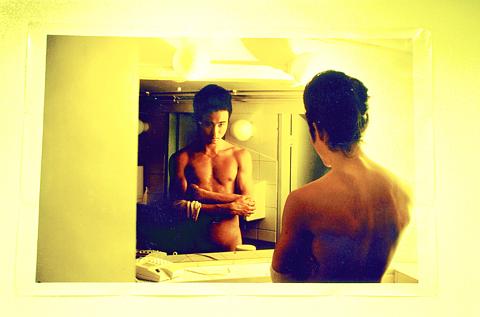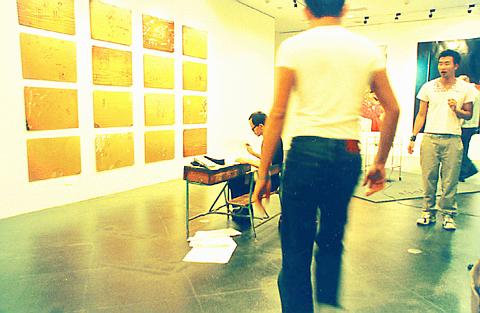In the 1955 Hollywood movie Love is a Many Splendored Thing, set in a romanticized Hong Kong on the eve of a Communist takeover, superstitious peasant farmers shouted "bad rice, bad rice" in order to trick jealous gods into not destroying their bountiful harvest.
Borrowing from that idea, Hong Kong curator Hiram To has also deceived the gods with his exhibition "Bad Rice: fooling the Gods," a show of seven artists from Hong Kong and one from Australia that focuses on making art in the fast-changing climes of Asia.
The "badness" of the show is not only derived from the work's playful, devious nature but also from its non-mainstream approach to art.

PHOTOS: COURTESY OF THE DIMENSION ENDOWMENT OF ART
The work ranges from large photographic tableaux to mixed media installations; however, from a city famed for its moving pictures, works on video are conspicuously absent. Most of the work comments on identity, but not Asian identity as one might expect -- instead, the artists examine their sense of fractured self.
For Choi Yan Chi's Past and Future 5: True Emotions (1998), a solitary desk of an elementary school student sits in the middle of the space. Across from it on the wall is a grid of photographed graffiti-laced desktops with scrawled missives of bilingual profanities, love messages, and sketches of comic book heroes -- basically, the jumbled thoughts and desires of Hong Kong youth, which prove to be as universal and banal as any other youth.
Nearby is Scott Redford's glaring red and yellow metal sign titled "This is not an artwork/this is a community service announcement" (1997-98) which loudly declares to no one's astonishment that "Keanu is Eurasian." As the only non-Asian in the show, Redford can easily identify with the amorphous self, divided between the East and West.

Another facet of self is gender identity and in his series "I only want you to love me" (1994), Kary Kwok photographs himself nude, masturbating and in drag. Each large direct positive print shows Kwok bandaged and bruised (by makeup), a statement on the fragility of sexual identity and the power of the gaze made inherent with the medium of photography.
Commenting on relationships -- romantic, political and linguistic -- the duo known as V.C. & K.H. present a teacart set for two -- "tea for two" -- complete with electric massager, which rests on a rubber mat inscribed with the song title "Shall we dance?" Perhaps alluding to the colonial view portrayed in Rodgers and Hammerstein's musical The King and I, the artist duo often use phrases from films and songs in their work to hint at broader meanings.
Downstairs, Wilson Shieh Ka Ho's meticulous ink on silk works mimic ancient Chinese erotic miniature paintings but his fetishized version is a commentary on the rapid commercialization of Asia: identical androgynous couples wear designer clothes, talk on cell phones and carry accessories.
Jo Law explores the spatial disorientation we experience daily in the city for her installation Mind the [Platform] Gap (1999). Three corrugated fun-house type mirrors hang on a bright yellow wall while photos of the curb are placed near an official-looking strip of yellow tape that gives the viewer a sense of standing too close to the edge of subway tracks.
In the dimly lit exhibition space, Patrick Lee's evocative, shadowy photos of a young hustler show us a seamy side of Hong Kong unknown to the average tourist. We crave, like voyeurs, to penetrate the darkness to see into this world but are frustrated that we cannot. Peering through alleyways, where one can almost smell the dank mustiness and hear the dripping pipes, Lee gives us a sense of the contemporary alienated urban condition.
Phoebe Man, who is known for her work about menstruation, now muses on manhood. For her floor installation, she stuffed numerous condoms with rice and eggshells. Looking like something that washed up on the beach, these sea anemones also take on alternative appearances, such as pearl onions, bunches of garlic and a long trail of intestines. Shiny and translucent, these speckled shapes seem to come to life.

TPP RALLY: The clashes occurred near the Chiang Kai-shek Memorial Hall on Saturday at a rally to mark the anniversary of a raid on former TPP chairman Ko Wen-je People who clashed with police at a Taiwan People’s Party (TPP) rally in Taipei on Saturday would be referred to prosecutors for investigation, said the Ministry of the Interior, which oversees the National Police Agency. Taipei police had collected evidence of obstruction of public officials and coercion by “disorderly” demonstrators, as well as contraventions of the Assembly and Parade Act (集會遊行法), the ministry said in a statement on Sunday. It added that amid the “severe pushing and jostling” by some demonstrators, eight police officers were injured, including one who was sent to hospital after losing consciousness, allegedly due to heat stroke. The Taipei

NO LIVERPOOL TRIP: Taiwan’s Lin Yu-ting, who won a gold medal in the boxing at the Paris Olympics, was embroiled in controversy about her gender at that event Taiwanese boxer Lin Yu-ting (林郁婷) will not attend this year’s World Boxing Championships in Liverpool, England, due to a lack of response regarding her sex tests from the organizer, World Boxing. The national boxing association on Monday said that it had submitted all required tests to World Boxing, but had not received a response as of Monday, the departure day for the championships. It said the decision for Lin to skip the championships was made to protect its athletes, ensuring they would not travel to the UK without a guarantee of participation. Lin, who won a gold medal in the women’s 57kg boxing

‘NOT ALONE’: A Taiwan Strait war would disrupt global trade routes, and could spark a worldwide crisis, so a powerful US presence is needed as a deterrence, a US senator said US Senator Deb Fischer on Thursday urged her colleagues in the US Congress to deepen Washington’s cooperation with Taiwan and other Indo-Pacific partners to contain the global security threat from China. Fischer and other lawmakers recently returned from an official trip to the Indo-Pacific region, where they toured US military bases in Hawaii and Guam, and visited leaders, including President William Lai (賴清德). The trip underscored the reality that the world is undergoing turmoil, and maintaining a free and open Indo-Pacific region is crucial to the security interests of the US and its partners, she said. Her visit to Taiwan demonstrated ways the

The US has revoked Taiwan Semiconductor Manufacturing Co’s (TSMC, 台積電) authorization to freely ship essential gear to its main Chinese chipmaking base, potentially curtailing its production capabilities at that older-generation facility. American officials recently informed TSMC of their decision to end the Taiwanese chipmaker’s so-called validated end user (VEU) status for its Nanjing site. The action mirrors steps the US took to revoke VEU designations for China facilities owned by Samsung Electronics Co and SK Hynix Inc. The waivers are set to expire in about four months. “TSMC has received notification from the US Government that our VEU authorization for TSMC Nanjing